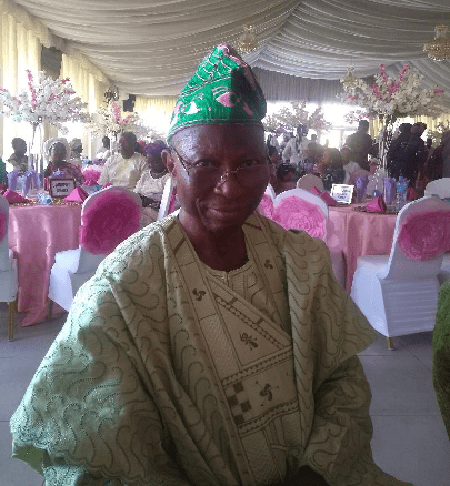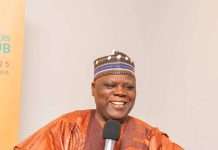Born on 30 October, 1944, at Ibogun Odejimi area of the present-day Ifo Local Government, Ogun State, Prof. Festus Adio Ogunbona is a pharmacist of high repute. An emeritus professor of Pharmaceutical Chemistry at Obafemi Awolowo University (OAU), Ile-Ife, he is an old boy of Igbobi College, Yaba, Lagos. Ogunbona, who bagged a B.Pharm from University of Ife (now Obafemi Awolowo University) in 1969 proceeded to obtain a PhD (in Pharmaceutical Chemistry) from Chelsea College, University of London in 1973.
In this interview with Adebayo Folorunsho-Francis, the former dean and deputy vice-chancellor (administration) of Obafemi Awolowo University recounts his activities as chairman of Pharmacists Council of Nigeria (PCN), his apathy to vying for presidency of the Pharmaceutical Society of Nigeria (PSN), as well as the circumstances that led to artemisinin combination therapy replacing chloroquine in malaria chemotherapy. Excerpts:

Sir, you were the chairman of PCN for five years. Tell us about the intrigues of managing such a complex institution and what has changed between the PCN of your time and now.
I was chairman of PCN from 2003-2007, not for five years. And I would rather talk about the strategies, not intrigues, in managing such an important federal government agency.
Firstly, I got myself well-informed about the activities of the Council by reading through all the previous minutes of the Council. I consulted widely with the relevant stakeholders, such that at the first meeting held on the day of inauguration, 14 August, 2003, three main challenges were identified and dealt with in a period of six weeks.
The Council took very important decisions at the second meeting in terms of its modus operandi. For instance, it was decided that all meetings of Council were to hold at the PCN headquarters, Idu, Abuja. Before then, the meetings were rotated round state capitals.
No representation was allowed at Council meetings. For example, if a state director of pharmaceutical services sent someone to represent him at a meeting, he would be admitted to the meeting only as an observer and was not paid any allowances (both travel and sitting). The resultant effect was an almost 100 per cent attendance by the membership, as stated in the PCN Law.
All matters placed before Council passed through its appropriate statutory committees, such that only their recommendations were discussed at the Council meeting. The statutory committees (serviced by appropriate departments of the Council) were carefully composed to ensure representation from the PSN, the state governments and the universities. Any fresh matters raised or arising from the deliberations from the statutory committee reports were referred to appropriate committees. This definitely cut down the time spent at Council meetings to a few hours (rather than days as in the past), while allowing a thorough discussion of all matters before decisions were taken.
What was your experience like working with the Nigerian Universities Commission (NUC) as a visiting professor?
In NUC, I had the opportunity of contributing towards the development of the entire Nigerian university system in several assignments I was given. I did do so by participation at various meetings, seminars and workshops. I also went on sentry visits to some universities in the company of staff of appropriate departments in the agency.
As chairman of NUC standing committee on private universities, tell us about the inherent challenges of such office and some anomalies you encountered.
My main duty as chairman, standing committee on private universities (SCOPU), was to guide the committee to carry out a thorough assessment of the various applications for establishment of private universities in the country, in accordance with the regulations in the NUC law on same. I was privileged to have, serving with me on the committee, highly intelligent and very experienced NUC staff (mostly deputy directors).
With the exception of Covenant University, University of Ibadan and University of Nigeria, no other Nigerian university made the list of Times 1,000 World University Ranking. From your experience as a former DVC, where did we get it wrong?
I would rather not comment on webometric rankings of Nigerian universities carried out on annual basis by some international organisations.
You have had a decorated career as deputy vice chancellor, dean and NUC professor. Of all these offices, which one did you find most challenging and why?
I do not know of any decorated career but all I know is that I served as the dean of my faculty, deputy vice chancellor (Administration) of my university and visiting professor to NUC at different stages of four decades of my academic career.
Each office presented itself with various challenges which were turned to opportunities. Definitely, the office of the DVC, where one was dealing with issues related to security of life and property on campus and various infrastructure serving both students and staff, such as electricity and water supply, posed the greatest challenge.
After a long wait, President Buhari has eventually announced his choice of candidates for the posts of health minister and minister of state for health respectively. Which areas do you think should be the focus of the ministers?
I am not a politician but I believe that the two ministers just appointed are quite conversant with the health situation in the country. One was a former minister of health in the first term of the current administration and the second was a former senator, who was very much involved during his four-year tenure in the health committee of the Senate.
I also believe that the two ministers are quite experienced to be able to sort out the priorities with adequate guidance from the officials of the ministry of health. I cannot pretend to be playing to the gallery. I am an academician who will make my comments and advise based on current information on ground.
For example, when I had the opportunity as the chairman of PCN in serving on a committee set up by the former minister of health (Prof. Eyitayo Lambo) to look into the adoption of WHO directive on the use of Coartem (artemisinin-lumefantrine) as the only artemisinin combination product to be used to replace chloroquine in malaria chemotherapy, I was able to convince the committee to modify the drug for Nigeria to artemisinin combination therapy (ACT). This was actually the original recommendation of the WHO.
The approval of our recommendation led to local manufacturing companies being able to manufacture and launch their own ACT products in the country. If the original recommendation from the FMOH had been approved, Nigeria would have been restricted to importing only Coartem to treat malaria. This was my humble contribution as an academic who had been involved in research on antimalarials for years.
How would you rate the Nigerian pharmaceutical industry, compared to your time?
I cannot assess the performance of the pharmaceutical industry now.
You have mentored quite a handful of successful pharmacists. Is there one or two that have impressed you so far? Tell us why.
I have many successful pharmacists who passed through my tutelage and are well placed in all the areas of the profession, including academic, industrial, community, hospital and administrative pharmacy. It is very difficult for me to pick even ten. I would rather not do that.
Is there any plan to take a shot at PSN presidency in future and what will be your reason(s)?
Never
Is there a particular reason for the apathy?
I believe that I have paid my own dues to the PSN in many spheres. Let our younger colleagues carry on the banner to higher and higher level.
You are yet to tell us about some laurels, awards and recognitions you have garnered over the years.
An academic, like l am, values only those honours related to my academic work. But I stated my fellowship of the PSN which I believe I earned, given my activities in the Society over the years, up to 1991. Recently, I earned the highest honour that could be bestowed on an academic by the university system in form of appointment as an emeritus professor. I consider this the greatest honour ever conferred on me.
If you were to be given a chance to practise Pharmacy in another dimension other than academia, what other arm of the profession would be your destination?
It is difficult for me to choose any other arm of the profession because some of my lecturers had been preparing me and some of my mates for the academia. I was not allowed to think of any other area, given the fact our VC had challenged those of us who were performing well in our set to be ready to go for our PhD.











We stumbled over here different website
and thought I should check things out. I like what I see so now i’m following you.
Look forward to finding out about your web page for a second time.
Like!! Great article post.Really thank you! Really Cool.
What an amazing story, Adebayo. Thank you for sharing!